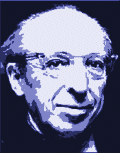
Aaron Copland
Had Aaron Copland never lived, American music would have been a barren field. Admittedly, there was also George Gershwin, Samual Barber and Leonard Bernstein, but without the music of Copland, it is doubtful that American music would have been taken seriously in the rest of the world.
More to the point, it is because of Aaron Copland that the others thrived.
Aaron Copland is the towering figure of American classsical music. While Gershwin and Bernstein did much to bring jazz and American popular music to a classical audience, Copland was the first to take on the ideas of modern music of the early twentieth century and use it to produce truely American music.
At a time when American music was distinctly frowned upon by critics, Copland spent much of his energy advancing its cause. Apart from composing, he was a accomplished writer, conductor and advocate for "Our New Music" (the title of one of his books).
The
Clarinet Concerto (also known as the
Concerto for Clarinet, Strings and Harp) came out of Copland's most fertile time. It was commissioned by Benny Goodman in 1947, and had its debut performance by him in 1950. It has the polish of a composer at his prime. In fact, Copland wrote very few major works after this concerto.
The structure is simple; a slow movement follwed by a fast movement, linked by a cadenza. The first movement is labelled "Slowly and expressively" and has hints of Latin America, where Copland drew his inspiration. Stoltzman's clarinet rises laguidly over the strings and harp. This is sweet, poignant music, beautifully played.
The cadenza for the solo clarinet is sharp and technically demanding, a virtuoso piece, and Stoltzman plays it with relish. It provides a bridge to the contrasting final movement, a lively, jazzy piece, again with Latin American influences. This section was written especially for Benny Goodman, and Copland's original scores show alterations added to show of Goodman's technique.
Unlike the
Clarinet Concerto, which is purely Copland, the remainder of the works on this CD are collaborations and arrangements for clarinet. Leonard Bernstein's
Sonata for Clarinet is orchestrated, and the
West Side Variants draws from both well-known and lesser known tunes from the musical. It is very refreshing to hear these new versions.
The Gershwin pieces that round off the CD are charmers.
Promenade comes from the movie
Shall We Dance,
Bess, You is My Woman Now from
Porgy and Bess and the
Three Preludes are arrangements of a group of six pieces by Gershwin, originally titled Novelettes.
This is an unashamedly American compilation, bold and brash at times, but also tender and expressive. The
meat of this CD is certainly the Copland
Concerto, but the other pieces make this an especially interesting compilation. Both Richard Stoltzman and Michael Tilson Thomas champion modern American music, and their love of these works is clear in this recording.
Please support Good-Music-Guide.com
by purchasing this CD using this link.

Track Listing
Aaron Copland (1900-1990)
Clarinet Concerto
and works by Leonard Bernstein and George Gershwin
Richard Stoltzman (clarinet)
Michael Tilson Thomas
London Symphony Orchestra
Aaron Copland (1900-1990)
- Clarinet Concerto (16:43)
Gordon Jenkins (b.1910)
- Goodbye (in memory of Benny) (arr. Douglas) (4:18)
Leonard Bernstein (1918-1990)
- Sonata for Clarinet (orch. Ramin) (11:32)
- West Side Story - Variants (arr. Bennet) (12:45)
George Gershwin (1898-1937)
- Promenade (Walking the Dog) (arr. Silverman(2:22)
- Bess, You is My Woman Now (arr. Silverman) (5:49)
- Short Story (arr. Sebesky) (3:04)
- - 11 Three Preludes (arr. Sebesky) (6:46)